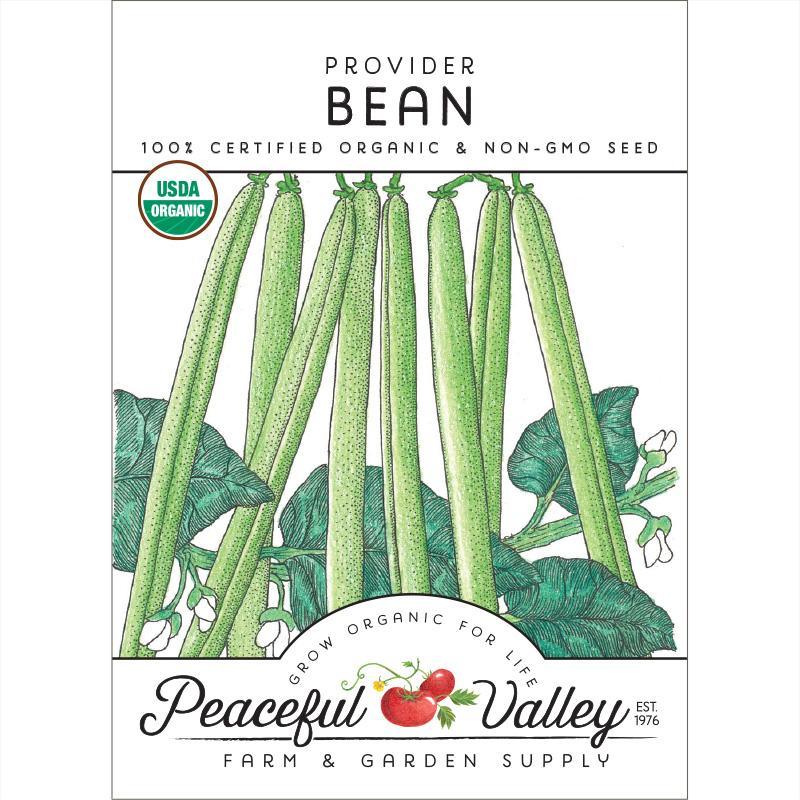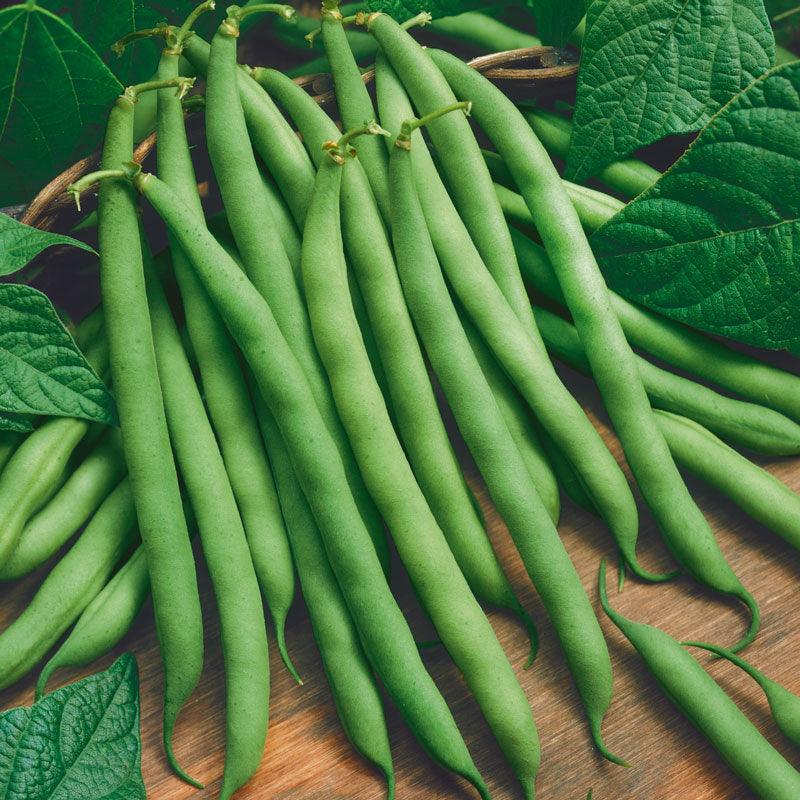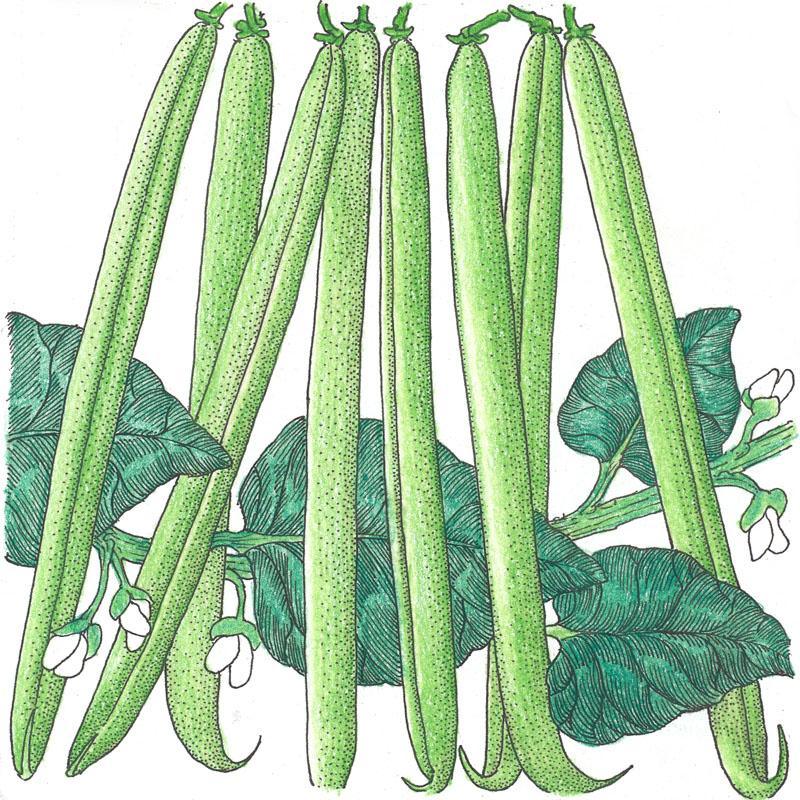Item Number: SNV8207
Provider Bush Bean Seeds (Organic)
Reliable yields, tender pods.
Provider Bush Bean is a dependable and high-yielding variety that produces crisp, tender pods with exceptional flavor. These beans are stringless and smooth, making them perfect for fresh eating, steaming, stir-frying, or preserving. Each plant grows in a compact bush habit, reaching about 18 inches tall and maturing in just 50-55 days, making it one of the earliest bean varieties to harvest. Thriving in full sun and well-draining soil, Provider Bush Beans are resistant to common diseases, such as bean mosaic virus and rust, ensuring vigorous growth and consistent production throughout the season. The plants are easy to grow and require minimal maintenance, making them an excellent choice for both novice and experienced gardeners. With regular harvesting, the plants will continue producing an abundance of flavorful pods over several weeks. Whether you’re growing for fresh meals or freezing for later, Provider Bush Beans deliver reliability, productivity, and great taste. Add this classic variety to your garden for a steady supply of delicious, homegrown beans.
Bean - Provider - Phaseolus vulgaris
Zones: 3-11
Soil Temperature: 65-85°F
Planting Depth: 1"
Germination: 7-10 Days
Height At Maturity: 16"-20"
Days To Maturity: 48-54 Days
Sun/Shade: Full Sun
Spacing After Thinning: 4"
Approx Seeds per Pack: 50 | Per 1/2 lb bulk: 873
Tender Annual Bush. Snap. Early USDA shipper produces 5"-8" medium-green pods, straight, round with a crease in back. Clusters, low fiber, purple seed, widely adaptable.
Did You Know? Resistant to bean common mosaic virus, the New York strain of BCMV, pea mosaic virus and rust. Developed by Dr. Hoffman of South Carolina in 1965. Legumes are a good source of calcium and iron.
Soil & Water: Legumes like well-drained soil rich in organic matter and a moderate amount of nutrients. Water lightly at planting, medium at flowering, and heavily throughout harvest time. Avoid overhead watering which can promote disease.
Planting & Growing: May start indoors in short-season climates, or sow seed directly once soils have reached at least 65°F, preferably after the last frost. Make small, successive plantings every 10 days for a continuous harvest.
Harvesting & Storage: Bush beans will produce all of their fruit over a few weeks' time. Leave the pods on the plant until they have completely dried. Store dry, shelled beans in an airtight container.
Planting Provider Bush Beans:
Soil Preparation: Prepare well-draining soil rich in organic matter, ensuring it has sufficient nutrients.
Watering Schedule: Lightly water at planting, increase to medium during flowering, and water heavily during harvest.
Starting Indoors: For shorter seasons, start seeds indoors. Otherwise, sow directly into soil at 65°F or higher, post last frost.
Successive Plantings: Opt for multiple plantings every 10 days for a continuous supply of beans.
Caring for Provider Bush Beans:
Harvest Schedule: Expect a concentrated harvest over a few weeks.
Harvesting Technique: Allow the pods to dry entirely on the plant before picking for storage.
Storage Guidelines: Store dried, shelled beans in an airtight container for future use.
Growth Details:
Soil Temperature: Ideal soil temperatures range between 65°F to 85°F for optimal growth.
Planting Depth: Plant seeds approximately 1 inch deep in the soil.
Germination Time: Seeds generally germinate within 7-10 days under favorable conditions.
Maturity Period: Provider bush beans typically mature within 48-54 days post-planting.
Sunlight Preference: These beans thrive best in full sun exposure.
Thinning and Spacing: After thinning, maintain a spacing of about 4 inches between plants.
Provider Bush Bean Traits:
Appearance: The Provider bush beans yield medium-green, straight pods, usually 5"-8" in length, with a slight crease along the back.
Resistance: This variety is resilient against various diseases like bean common mosaic virus, pea mosaic virus, and rust.
Adaptability: Provider beans boast adaptability to different growing conditions, making them widely suitable for varied climates.
Nutritional Benefits: As legumes, these beans are a good source of calcium and iron, contributing to a balanced diet.
Check out our Bean Growing Guide for more information.




Check Your Zone Compatibility:
Compatible with your zone.
Growing Zone for

Our Guarantee To You
Since 1976, we've served our customers at every stage of growing. Please contact us at any time. We are happy to support and assist you.
Shipping Information
Shipping Information
Shipping Weight: 0.05 lb
Dimensions: 4.5"L x 3.25"W x 0.1"H
Features
Features
- Fixes Nitrogen
- Good for Beginners
- Open-Pollinated
- Succession Planting
Characteristics
Characteristics
Planting & Care
Planting & Care
Soil & Water: Legumes like well-drained soil rich in organic matter and a moderate amount of nutrients. Water lightly at planting, medium at flowering, and heavily throughout harvest time. Avoid overhead watering which can promote disease.
Planting & Growing: May start indoors in short-season climates, or sow seed directly once soils have reached at least 65°F, preferably after the last frost. Make small, successive plantings every 10 days for a continuous harvest.
Harvesting & Storage: Bush beans will produce all of their fruit over a few weeks' time. Leave the pods on the plant until they have completely dried. Store dry, shelled beans in an airtight container.
Useful Information
Useful Information
Guarantee
Guarantee

Peaceful Valley Farm & Garden Supply brand vegetable seeds are guaranteed to germinate. Once the seeds have sprouted, please understand that Peaceful Valley cannot be held responsible for the many uncontrollable growing and climatic conditions that must be met to ensure the success of your crop(s).
Share






